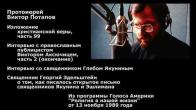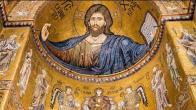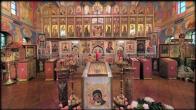You are here
St. Tykhon (Tychon), bishop of Voronezh, wonderworker of Zadonsk
13/26 August
 Hierarch Tychon (in the world, Timothy) was born in 1724 into the family of a most poor cleric of the village of Korotska (Valdai district) and soon after birth was deprived of his father. His childhood and boyhood passed amidst terrible poverty: once he had to work a whole day for the inhabitants of his native village for a piece of bread. He barely escaped recruitment as a soldier and entered the Novgorod Seminary to study, in which he later became an instructor. Certain special circumstances (a miraculous rescue from mortal danger and certain visions) disposed him toward accepting monasticism. In 1758, he was tonsured into monasticism with the name Tychon. The following year he was appointed rector of the Tver Seminary, where he gave lectures on moral theology. Moreover, he gave them in Russian, and not in Latin, as was the accepted practice before him. Besides the students, many outside persons would come to his lectures.
Hierarch Tychon (in the world, Timothy) was born in 1724 into the family of a most poor cleric of the village of Korotska (Valdai district) and soon after birth was deprived of his father. His childhood and boyhood passed amidst terrible poverty: once he had to work a whole day for the inhabitants of his native village for a piece of bread. He barely escaped recruitment as a soldier and entered the Novgorod Seminary to study, in which he later became an instructor. Certain special circumstances (a miraculous rescue from mortal danger and certain visions) disposed him toward accepting monasticism. In 1758, he was tonsured into monasticism with the name Tychon. The following year he was appointed rector of the Tver Seminary, where he gave lectures on moral theology. Moreover, he gave them in Russian, and not in Latin, as was the accepted practice before him. Besides the students, many outside persons would come to his lectures.
In 1761, in the 37th year of his life, Hieromonk Tychon, in accordance with a manifest indication from on high, was chosen to be a bishop. For about two years he was a vicar in Novgorod, and for about four years (17631767) he headed the episcopal cathedra in Voronezh on his own. The whole time of his episcopate, he diligently preached and urged the priests subordinate to him to do the same. In Voronezh, from pagan times, a feast in honor of Yarilo was kept, which was accompanied by every kind of excess. Once the Hierarch unexpectedly appeared at the public square at the very height of the merrymaking and began to denounce the dissolute. His word had such an effect that the feast was no longer revived.
Meanwhile, his intensified labors ruined Hierarch Tychon's health. He obtained release from his post and passed the last sixteen years (17671783) of his life in retirement in the Zadonsky Monastery (near the Don River, to the north of the city of Voronezh). All of his time, with the exception of 45 hours of rest, was dedicated to prayer, reading the word of God, works of charity and the compilation of soulbenefiting compositions. Every day he would go to church. At home he would often fall on his knees and, bathed in tears, as the most vile sinner, would cry out: "Lord, spare me; Lord, have mercy!" Every day, without fail, he would read several chapters from Sacred Scripture (especially from the Prophet Isaiah), and on the road, he would never travel without a small Psalter. All of his 400ruble pension would go to charity, and thither too was directed all that he received as gifts from acquaintances.
He would often set off in simple monastic garb for the nearby city (Yelets) and visit those confined in the local prison. He would comfort them, dispose them towards repentance and then bestow alms upon them. He himself was nonacquisitive to the highest degree and lived amid conditions most simple and poor. Sitting at a meagre table, he would often remember the poor who did not have such sustenance as he, and he would begin to reproach himself for laboring so little, according to his judgment, for the Church.
Here bitter tears would begin to flow from his eyes. By nature ardent and irascible, he was amazingly meek and mild. He would bow down to the ground before his cellattendant, asking forgiveness for some word that seemed offensive to him, and he would always try to return good when someone inflicted some insult upon him. Once, in the home of an acquaintance, he entered into a conversation with a nobleman, a Volterian, and meekly, but so powerfully refuted the atheist in every way that the proud man could not endure and, forgetting himself, struck the Hierarch in the face. Hierarch Tychon threw himself at his feet and began to beg forgiveness that he had lead him into irritation. This humility of the Hierarch so affected the impertinent insulter that he was converted to faith and became a good Christian.
Saint Tychon possessed the gift of performing wonders and of clairvoyance, and would read the thoughts of a conversor. In 1778, when the Emperor Alexander I was born, the Hierarch foretold many events of his reign and, in particular, that Russia would be saved, and the invader (Napoleon) would perish. "In many instances, the Lord God listened to him" wrote Hierarch Tychon's cellattendant.
The Hierarch especially loved to converse with the simple people; he would comfort them in their difficult lot and help those who were ruined. Children would visit him from the settlement near the monastery. He would teach them prayers, and after a talk would bestow money on them. Hierarch Tychon's blessed end occurred on the 13th of August,1783. After 63 years, his incorrupt relics were opened, and in 1861 he was added to the choir of the saints. Among Hierarch Tychon Zadonsky's written works, a collection of short instructions full of examples from life, which is called "Spiritual Treasure Collected from the World", enjoys particular popularity.
Relics in cathedral - monthly calendar
| S | M | T | W | T | F | S |
|---|---|---|---|---|---|---|
|
|
|
|
1
|
2
|
3
|
4
|
|
5
|
6
|
7
|
8
|
9
|
10
|
11
|
|
12
|
13
|
14
|
15
|
16
|
17
|
18
|
|
19
|
20
|
21
|
22
|
23
|
24
|
25
|
|
26
|
27
|
28
|
29
|
30
|
31
|
|
PARISH LIFE
Address of our Cathedral
While all the materials on this site are copyrighted, you may use them freely as long as you treat them
with respect and provide attribution on the Russian Orthodox Cathedral of St.John the Baptist of Washington DC.









